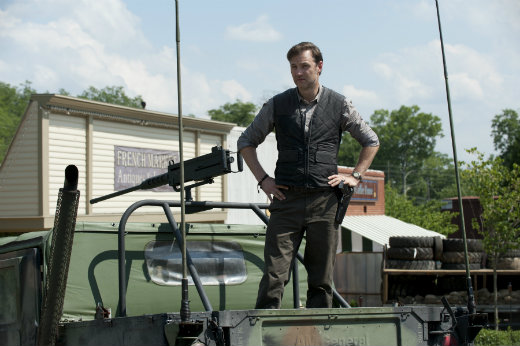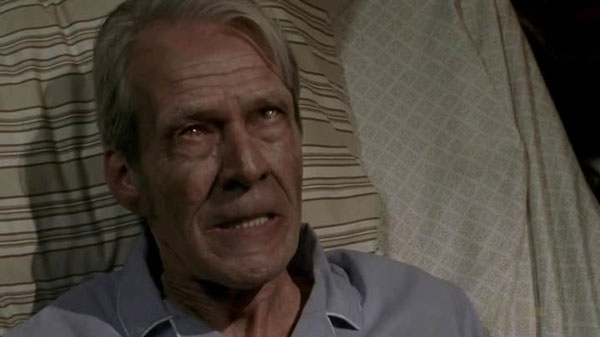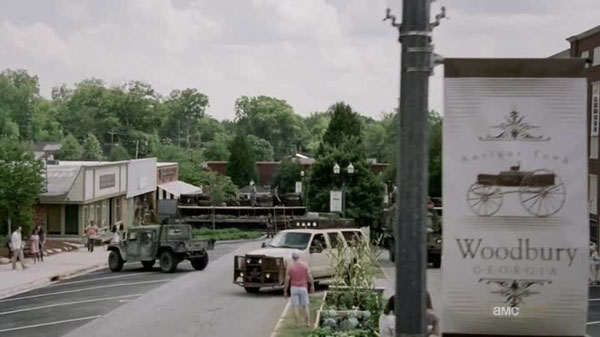Last night AMC aired the mid-season finale for The Walking Dead until the series resumes in February of 2013. In light of the break I thought I’d share some reflections that came to mind as a result of the last few episodes.
One of the interesting plot elements that connect The Walking Dead to previous explorations of the zombie in film is the character in Woodbury who is conducting experiments on the walkers/biters. This is reminiscent of Romero’s Day of the Dead (1985) where a small group of military and scientific personnel hide underground and experiments are conducted on the zombies in an effort, perhaps, to train them not to be cannibalistic. In The Walking Dead the viewer isn’t quite sure what the intent of the experiments are, but they suggest that there is a hope that aspects of the “pre-walker” personality remains after “resurrection” and can be tapped into. This is evident in the experiment with Mr. Coleman who is dying of prostate cancer, and who volunteers for a simple experiment where a routine is established connected to a sound, music, and responses to a series of simple questions that are learned before death, and then repeated after death and reanimation so as to hopefully connect with the pre-zombie personality. It is likely that the Governor’s emotional connection to this daughter who is a walker is the driving force behind these experiments. Even so, the experiment fails as Mr. Coleman shows no signs of his prior personality and is quickly dispatched by Andrea. This aspect of the zombie narrative also picks up an element that goes back to the first episode of the series in Season One where a walker returned continually to her prior home in life and looked at the door as if she had some lingering memory of connection there. This ongoing narrative thread not only makes for an interesting storyline, it also makes it more problematic for those in the series. It is one thing to kill reanimated rotting cannibals with no mental connection to their previous selves, but if vestiges of their former selves remain after reanimation then it presents new ethical considerations for the survivors. In addition, one can connect the dots to our conversations and debates about self and personhood and ethics in connection with those with diseases and disorders of the brain.
The city of Woodbury also presents other areas for reflection. I find the name of the new town of interest in that it is similar and dissimilar to Mayberry from the popular comedy television series The Andy Griffith Show. In that program an idealized small town of the South was presented, and Woodbury has some similarities in that it represents an idealized town that attempts to shield its citizens from the realities outside the artificial construct. But Woodbury is very dissimilar in that it is a municipality that does not have a benign sheriff as its leader, but instead, a manipulative and abusive, self-appointed, dictatorial “Governor.”
In this context the program also raises the issue of gender roles. Last season Andrea worked to establish herself as an individual who transgressed gender role expectations. On the farm women did the cooking, cleaning and other work related to female gender roles in past decades, but Andrea rebelled at that and was actively involved in roles occupied by male characters. Now in Woodbury, Andrea has attempted to occupy the same redefined gender role, but has met resistance, including from her new romantic interest in the Governor, who prefers that she assume a more traditional gender role and not be as vocal as the males in the group.
 In a final observation, the mid-season finale also saw the use of loaded terminology that connects to one of our pressing national debates. As Rick’s small group attempted a rescue of two of its members, and violence ensued, the Governor, in a speech to Woodbury citizens, was quick to label this as a terrorist action and those responsible as terrorists. The use of this terminology was calculated on his part, as it attempts to categorize the offenders as violent outsiders (including one who was previously an insider) with no legitimate claims in relation to the citizens of Woodbury, who can be easily dismissed and even executed as a threat to the Woodbury “way of life.” This, of course, echoes much of the American rhetoric of the War on Terror. In one of the behind the scenes videos on the AMC website, one of the production crew comments on this episode and states that from the perspective of the citizens of Woodbury, Rick and his group are terrorists, reminding us of the subjective and point of view aspect of labels and relationships. One group’s freedom fighters or rescue party is another group’s terrorists.
In a final observation, the mid-season finale also saw the use of loaded terminology that connects to one of our pressing national debates. As Rick’s small group attempted a rescue of two of its members, and violence ensued, the Governor, in a speech to Woodbury citizens, was quick to label this as a terrorist action and those responsible as terrorists. The use of this terminology was calculated on his part, as it attempts to categorize the offenders as violent outsiders (including one who was previously an insider) with no legitimate claims in relation to the citizens of Woodbury, who can be easily dismissed and even executed as a threat to the Woodbury “way of life.” This, of course, echoes much of the American rhetoric of the War on Terror. In one of the behind the scenes videos on the AMC website, one of the production crew comments on this episode and states that from the perspective of the citizens of Woodbury, Rick and his group are terrorists, reminding us of the subjective and point of view aspect of labels and relationships. One group’s freedom fighters or rescue party is another group’s terrorists.
The Walking Dead continues to do well in the ratings, and this may be understood as relating to its gripping storytelling. Viewers are also fortunate that this series incorporates elements that related to some of our most pressing social and cultural issues for those who want to find and reflect on them.







John,
Thanks for sharing these reflections. I know you caught the Governor’s line, “They want what we have!” He might as well have said, “They hate us for our freedom!” great episode.